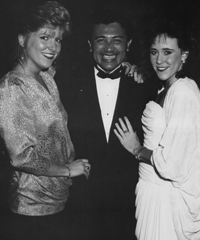In the spring of 1987, Baron Maurice J.L. de Rothschild enrolled in the continuing-education program at Duke. He drove a Honda CRX but told fellow students that he had a Maserati at home in France, where his famously wealthy family lived in a 270-room chateau. He told new friends about dining with President Ronald Reagan and vacationing with the Kennedys on Cape Cod. He carried a cell phone and a laptop computer in the days when both were rare. He joined Sigma Alpha Epsilon and sat behind the bench at men’s basketball games.
There was just one problem. He wasn’t actually a Rothschild. In fact, he wasn’t who he said he was at all.
The campus community realized the ruse in 1989 after a Chronicle investigative story. At that point, the man had stolen funds from friends, embezzled money, and defaulted on loans and credit cards. Students were left reeling. Who was this stranger?
It turned out that thirty-seven-year old Mauro Jeffery Rothschild (he legally changed his name from Cortez) had pulled similar stunts at the University of California at Berkeley and the University of Texas before his audacious fraud at Duke. He claimed to be a student at UT but was never actually enrolled. In 1982, he moved into a condo with “fellow” UT students, who grew suspicious. “He’d always show off things he said were from other countries,” one of his housemates later told a reporter. “But all of us knew you could buy those things at Pier One Imports.”
After being exposed as a fraud, he bolted, emerging the following year at Berkeley. He enrolled in a summer program and pledged Sigma Alpha Epsilon. An unusual personality, he attracted attention on campus by wearing a full-length mink coat. He failed to complete pledge responsibilities, like cleaning up, and was kicked out of the fraternity. Rothschild left town not long after, leaving behind an $11,000 unpaid bill at Neiman Marcus.
At Duke, he was never admitted as an undergraduate but instead attended classes through the continuing- education program, which at the time required only transcripts and a letter of recommendation. Rothschild explained that he had been tutored as a child and therefore had no transcripts. He rented a room in a Durham townhouse, and told guests that his roommate was his butler. He was enrolled in elementary French, which seemed odd for a native French speaker, but still most students took him at his word.
He was often remarkably generous. A Durham Morning Herald article from 1989 reported, “According to SAE members, de Rothschild once bought ‘a tremendous number’ of pizzas for a party—one of each kind—because he said he had never eaten the food and didn’t know what to put on it.” Claiming he had been cut off by his parents but would soon have his inheritance, he managed to borrow thousands of dollars from friends and others. He also embezzled money from a charitable fund set up by SAE to help families of cancer patients, as well as funds from a swim-team event.
The jig was up for Rothschild in September 1989, when his odd behavior at a national SAE convention caught the attention of officials. Upon investigating further, they questioned his identity and became alarmed by missing funds and unpaid bills. Rothschild disappeared before being indicted by a grand jury in November 1989 on twelve counts of embezzlement and obtaining money by false pretense.
Rothschild resurfaced in January 1990, when he was arrested in Florida after being spotted working at a car-rental business. Past crimes, in addition to the Durham-based charges, caught up to Rothschild, and he was eventually sentenced to several years in prison. Many details of the story, including Rothschild's activities in Berkeley and Austin, were uncovered by Duke alumnus Phil Hirschkorn ’89 in a March 1990 Rolling Stone article and later newspaper articles.
How could this happen at Duke? Part of it was the time period—without electronic verification, it was easier to pose as someone else. Part of it was the fact that Duke has enrolled many students from prominent families and, while unusual, it wasn’t unthinkable to have a Rothschild on campus. Finally, part of it was the nature of Duke students to be good-hearted and believe what their peers said about themselves.
Mary Duke Biddle Trent Semans ’39, Hon. ’83, then a trustee at Duke, told the Morning Herald: “I go back to [Alexis] de Tocqueville. I think Americans in general trust people, trust each other, and I think that’s the way it went.”
Gillispie is the university archivist.



Share your comments
Have an account?
Sign in to commentNo Account?
Email the editor